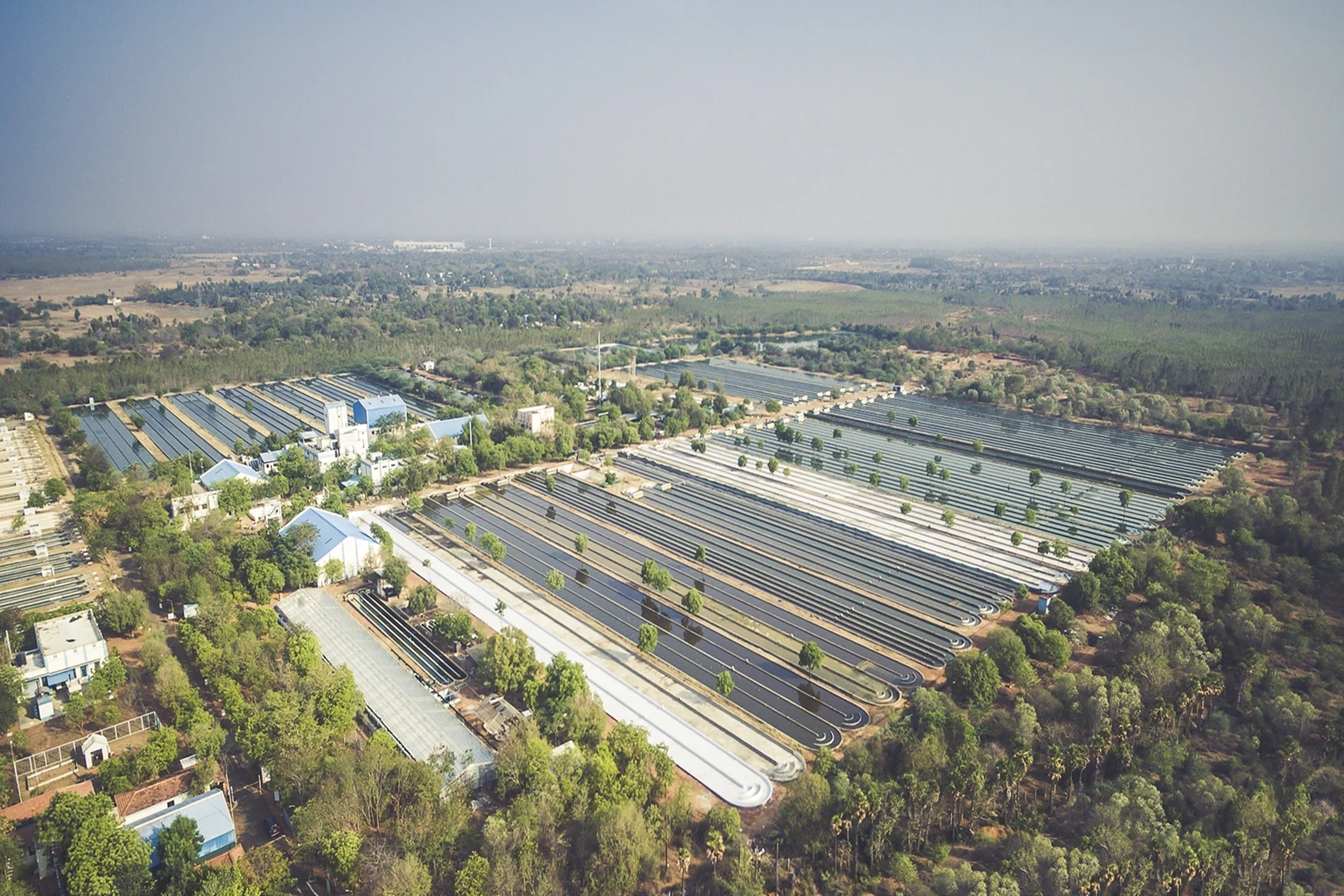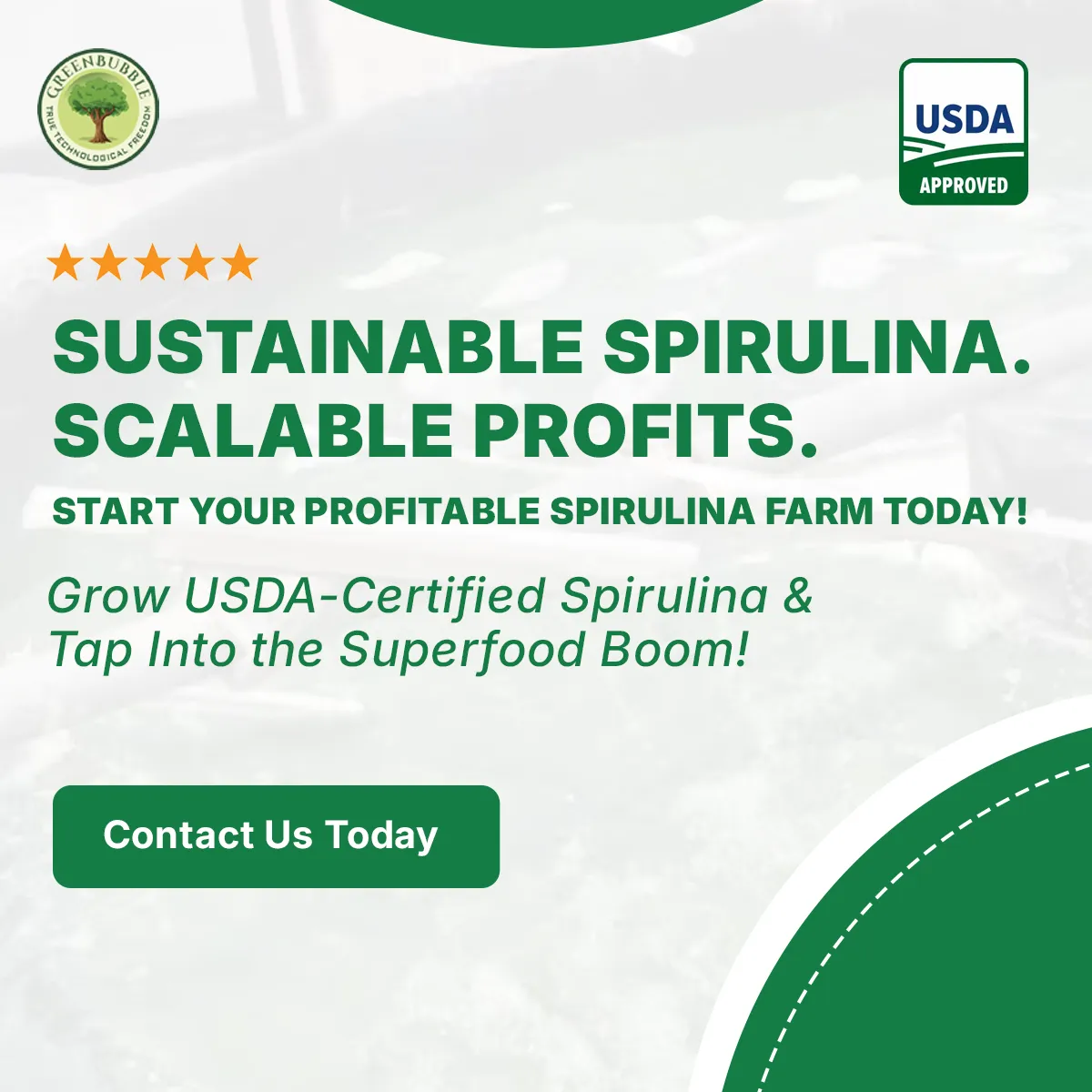It’s green, clean, and full of protein.
Spirulina, once a fringe health food, has now gone mainstream—finding its way into capsules, smoothies, energy bars, and even skincare. But behind every gram of spirulina powder is a well-structured farm, built with precision, planning, and purpose.
If you’re asking, “What do I need to start a spirulina farm?”, you’re already on the right path. This guide lays out every critical piece—land, tanks, equipment, cost, certification, and more—so you can plan smart and scale sustainably.
Let’s get you started.
1. Land: Choosing the Right Site for Cultivation
Spirulina is cultivated in shallow tanks, not on soil—so you don’t need fertile land. But you do need:
- Flat, rectangular land (easier tank layout)
- 8–10 hours of direct sunlight daily
- A non-polluted zone (away from pesticide-heavy farms or factories)
- Access to clean water (borewell, filtered surface water)
- A temperature range of 30–35°C (ideal for spirulina growth)
Pro Tip: For a scalable farm, aim for at least 1 acre. This gives room for tanks, drying unit, lab, packing, and walkways.
➡️ More on location planning: What Are the Ideal Site Parameters for Setting Up a Plant?
2. Tank System: Your Farm’s Core Infrastructure
Spirulina doesn’t grow in ponds or fields—it needs engineered cultivation tanks. There are several types:
✅ Raceway Ponds
- Large, paddlewheel-agitated shallow channels
- Ideal for commercial, 1-acre+ farms
- Compatible with automation
➡️ See: Raceway Pond Solutions
✅ HDPE-Lined Tanks
- Modular and fast to install
- Ideal for pilot or medium-scale setups
- Budget-friendly, shorter lifespan
✅ RCC Cement Tanks
- Durable, long-lasting
- High upfront cost, low maintenance
- Best for organic farms and large-scale setups
✅ FRP Tanks (for R&D)
- Compact, lab-friendly
- Not scalable but good for trials or rooftop farming
3. Equipment: Tools That Drive Spirulina Farming
A productive spirulina farm relies on automation and hygiene. Here’s what you’ll need:
Essentials:
- Paddlewheel or efficient agitator (ensures uniform circulation)
- pH and temperature sensors (IoT-enabled preferred)
- Dewatering system (manual press or auto-discharge)
- Drying system (vacuum/refractive window preferred)
- Harvesting mesh/filter unit
- Stainless steel or food-grade pumps & piping
- Packing tools (heat sealer, pouches, storage)
Optional (but recommended for large farms):
- SCADA system (real-time monitoring)
- Water treatment unit
- Solar power backup
➡️ See ready-to-install kits: Spirulina Farming Turnkey Solutions
4. Lab Setup: The Heart of Spirulina Quality Control
Don’t skip the lab. Spirulina farming without a lab is like driving blindfolded.
Your in-house lab supports:
- Culture inoculation
- Quality inspection (smell, color, foam)
- COA prep (in coordination with third-party labs)
Basic equipment needed:
- Compound microscope
- Incubator
- Water testing kit
- Clean benches/inoculation hood
- Glassware, pH meter
Your lab ensures every batch is safe, pure, and market-ready.
➡️ Learn more: How to Test Spirulina Quality
5. Inputs: Water, Nutrients, and Carbon Source
Spirulina requires:
- Alkaline water (pH 9–11)
- Sodium bicarbonate (carbon source)
- Nitrogen, phosphorus, magnesium, iron
- Clean, food-grade chemicals (OMRI-listed for organic farms)
You can choose between:
- Standard nutrient mix (lower cost, not organic)
- Organic-certified inputs (more expensive but fetch higher prices)
Tip: Use RO or UV-treated water to prevent contamination.
6. Cost Breakdown: What Does It Cost to Start?
Here’s a ballpark estimate for a 1-acre, IoT-enabled farm:
| Component | Cost (Approx.) |
| Land & civil works | ₹15–20 lakhs |
| Tanks + Roofing | ₹20–30 lakhs |
| Equipment + Automation | ₹20–25 lakhs |
| Lab Setup | ₹3–6 lakhs |
| Drying + Packing | ₹7–10 lakhs |
| Water + Power Systems | ₹5–7 lakhs |
| Certification + Legal | ₹2–3 lakhs |
| Total (1 Acre) | ₹75–95 lakhs |
Startup with a pilot farm? You can begin at ₹7–10 lakhs and scale as you learn.
➡️ Explore profitability models here: Spirulina Farming Costs and Profits
7. Certifications: Getting Premium-Ready
If you want to sell spirulina at premium prices, certification is non-negotiable.
Must-have certifications:
- COA (Certificate of Analysis per batch)
- India Organic/NPOP
- USDA Organic or EU Organic (for exports)
- GMP, HACCP, ISO 22000 (for supplement manufacturing partners)
These certifications:
- Increase trust and buyer interest
- Unlock export opportunities
- Justify price of ₹1500–₹2200/kg
8. Packaging and Distribution
Once dried and tested, spirulina must be:
- Packed in moisture-proof, food-grade containers
- Labeled with batch ID, harvest date, COA reference
- Stored in cool, dry rooms
You can sell as:
- Bulk powder (B2B)
- Retail packs (B2C)
- Capsules, tablets, sachets (value-added products)
Distribution options:
- Health stores
- D2C websites
- Nutraceutical manufacturers
- International export (via B2B buyers)
➡️ Learn how to sell smart: Spirulina Marketing – How to Stand Out
9. Market Demand and Buyers
Here’s where it gets exciting.
Spirulina is in demand across:
- Health & fitness markets
- Immunity and detox categories
- Pet and poultry feed
- Cosmetics and vegan skincare
- Contract manufacturers
Buyers include:
- Nutraceutical brands
- Organic food startups
- Supplement exporters
- Ayurvedic brands
➡️ See global trends: Market Trends and Opportunities
10. Government Support You Can Leverage
Good news—spirulina farming qualifies under multiple government schemes:
- PMFME Scheme: For food processing and packaging
- Aquaculture Incentives: For tank-based protein farming
- Mudra Loans: For MSME startups (up to ₹10 lakhs, collateral-free)
- Startup India: For tech-enabled, smart agriculture models
- Agri Business Incubators: For pilot farms and R&D units
➡️ Find relevant grants: Government Grants and Subsidies
Final Thoughts – Spirulina Farming is a Smart, Scalable Venture
Starting a spirulina farm isn’t about getting your hands dirty—it’s about getting your systems right.
From land and tanks to lab and drying, every piece connects to build a future-proof, sustainable agribusiness. With high margins, consistent demand, and global export appeal, spirulina ticks all the boxes for new-gen farmers, wellness brands, and climate-conscious entrepreneurs.
Whether you’re starting with 1000 sq. ft. or 1 acre, the opportunity is real—if you build it right.
👉 Ready to Build Your Spirulina Farm with Confidence?
At Greenbubble, we help first-time and seasoned agri-entrepreneurs set up profitable spirulina farms from scratch—complete with:
- Tank design & layout
- Smart automation integration
- Lab and inoculation planning
- Drying, packing & COA systems
- Certification support
- Market linkage (D2C/B2B/export)
👉 Contact us today for a step-by-step consultation and a free starter blueprint.


